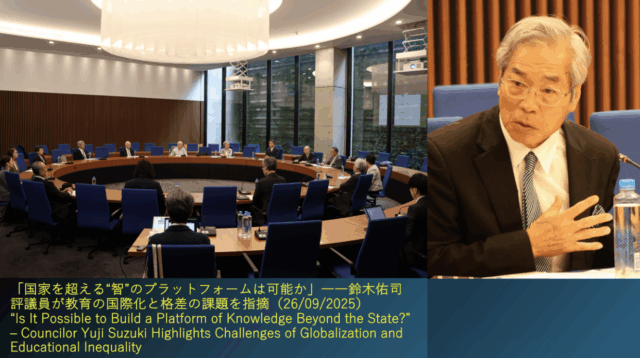
At the Council Meeting of the Kyoto International Peacebuilding Center, Mr. Yuji Suzuki, Council Member of the Center and President of the National Federation of UNESCO Associations in Japan, offered his reflections following the keynote lecture by Professor Miki Sugimura, President of Sophia University. He addressed the prospects of educational globalization and the potential for creating a “platform of knowledge” that transcends national boundaries.
Mr. Suzuki began by commending Professor Sugimura’s lecture as “highly persuasive and visionary in presenting the future direction of higher education, particularly in the Asian context.” Referring to remarks made by Honorary Chair Sukehiro Hasegawa, he posed a central question: “Is it truly possible to build a platform of knowledge that transcends geopolitical borders and the framework of the state?”
Drawing from his expertise in Southeast Asian studies, Suzuki observed that “as nations achieve economic growth, they tend to internalize education as a tool of governance, which in turn reinforces structural inequality.” In multiethnic and multireligious societies, he warned, “the monopolization of education by those in power creates systemic exclusion.” This, he suggested, raises a fundamental question: “Why were nation-states established in the first place, and for what purpose was national identity formed?”
At the same time, Suzuki acknowledged that the movement of knowledge across borders in Asia is undeniably progressing. The expansion of online academic exchange following the COVID-19 pandemic has blurred national boundaries and fostered new forms of collaboration. Yet, he cautioned, “when such cooperation becomes politically inconvenient for governments, it can be suppressed,” noting that “young researchers not only lack academic freedom but may even face the risk of arbitrary detention.”
Speaking from his own university’s experience, Suzuki shared that “of 1,500 faculty members, over 100 are Chinese scholars, and there are plans to welcome researchers from Nepal and Vietnam.” However, he noted that political tensions between governments pose a significant challenge to sustaining these collaborations.
Suzuki further pointed out that while international organizations such as UNESCO promote the globalization of higher education, “a critical issue remains: how to provide learning opportunities to those excluded at the primary and secondary levels.” He criticized governments for prioritizing global university rankings and research output to enhance international competitiveness, often at the expense of basic education, which leads to mechanisms of exclusion and concentration of privilege.
He also cautioned that measures such as affirmative action, while intended to promote inclusion, can paradoxically deepen exclusion. Moreover, he noted a concerning trend of prioritizing national language education over multilingualism, warning that “as universities globalize, foundational education risks being neglected.”
In closing, Suzuki called for thoughtful consideration of how globalization and basic education can coexist and complement one another, emphasizing the need to pursue a sustainable and equitable educational framework.
For other speakers’ statements and further details of the meeting, please click here.
(Reported by Koki IMON)
Original Speech (English Translation)
Yuji Suzuki, Council Member of the Kyoto International Peacebuilding Center, President of the National Federation of UNESCO Associations in Japan
Thank you very much, Professor Sugimura. Your lecture was highly convincing and clearly presented the future direction of higher education, particularly in Asia.
I would like to raise a question related to the points explained by Professor Hasegawa—whether it is truly possible to build a “platform of knowledge” that transcends the state, rather than merely geopolitical borders. From the perspective of someone who studies Southeast Asia, as nations achieve economic growth, there is a strong tendency to internalize education within the state and use it as an instrument of control. Meanwhile, Southeast Asian countries are characterized by religious, cultural, and ethnic diversity; because of this, power often monopolizes education, leading to structural inequality. Observing this situation brings us back to a fundamental question: why were nation-states created, and for what purpose was national identity formed?
Among scholars, it is often said that in Asia there is indeed a growing movement for knowledge to cross borders. This is a new kind of academic exchange that I have never seen before, facilitated by the spread of the Internet during the COVID-19 pandemic, which blurred national boundaries. International cooperation in higher education is strengthening, yet if it becomes politically inconvenient, it is easily obstructed. Young researchers are often unable to work freely and even risk unjust detention.
At my university, more than 100 of our 1,500 faculty members are Chinese researchers. We also plan to welcome scholars from Nepal and Vietnam, but relations between our governments are not always smooth, posing a serious challenge for international collaboration.
I would also like to point out that while UNESCO and other international organizations play a visible role in promoting the globalization of higher education, we must not forget those left behind—people excluded from education at the primary and secondary levels. Governments pour vast resources into improving university rankings, inviting foreign scholars, and increasing publication numbers to boost competitiveness, but at the same time neglect the foundations of basic education. This creates a distorted mechanism where the majority monopolize educational access.
From my own experience, even systems such as affirmative action—intended to promote inclusion—can in practice reinforce exclusion. Furthermore, the prioritization of national language education often leads to a retreat from multilingual education. Given these realities, there is a growing danger that while universities become more international, basic education will continue to be neglected.
In light of this, I would like to ask: how can we reconcile the advancement of globalization with the protection and enhancement of foundational education?
